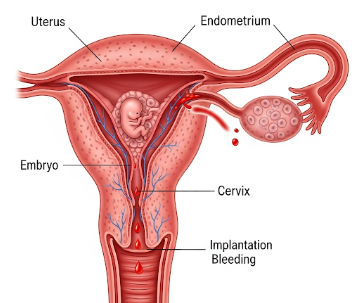Overview
Implantation bleeding is light vaginal bleeding that can occur when a fertilized egg attaches to the lining of the uterus, usually around 6–12 days after ovulation. It is often lighter in flow than a regular menstrual period and may be pink or brown in color.
While implantation bleeding is typically harmless and a sign of early pregnancy, it is important to differentiate it from other causes of bleeding, such as hormonal imbalances, infections, or early miscarriage.
In South Korea, gynecology clinics provide early pregnancy evaluation, ultrasound diagnostics, and guidance for managing early pregnancy symptoms, ensuring safety and peace of mind for expectant mothers.
Key Facts
🟢 ➤ Implantation bleeding occurs in approximately 20–30% of early pregnancies.
🟢 ➤ Typically happens 6–12 days after ovulation, just before the expected menstrual period.
🟢 ➤ The bleeding is usually light, pink or brown, and lasts a few hours to a few days.
🟢 ➤ It is often accompanied by mild cramping, breast tenderness, and other early pregnancy symptoms.
🟢 ➤ Diagnosis involves confirming pregnancy through blood or urine tests and sometimes ultrasound.
🟢 ➤ Most cases resolve on their own and do not require medical intervention.
What is Implantation Bleeding?
Implantation bleeding is the release of a small amount of blood when the fertilized egg embeds itself into the uterine lining.
➤ The uterine lining (endometrium) is rich in blood vessels, which may slightly bleed when disrupted by implantation.
➤ The bleeding is usually lighter than a menstrual period and does not clot.
➤ It is considered one of the earliest signs of pregnancy and may occur before a missed period.
➤ Implantation bleeding should be distinguished from other causes such as spotting due to hormonal fluctuations, infections, or early pregnancy complications.
Symptoms Related to Implantation Bleeding
Implantation bleeding may be accompanied by mild early pregnancy symptoms:
🟢 ➤ Light pink, red, or brown vaginal spotting lasting a few hours to a few days.
🟢 ➤ Mild cramping similar to menstrual cramps.
🟢 ➤ Breast tenderness or swelling.
🟢 ➤ Fatigue, nausea, or food sensitivities.
🟢 ➤ Mood swings or heightened sense of smell.
🟢 ➤ Sometimes no other symptoms appear, and bleeding is the first noticeable sign.
Causes / Possible Causes
Implantation bleeding occurs when the fertilized egg attaches to the uterine lining, but other factors can influence its occurrence:
Normal Early Pregnancy Process
➤ Embryo implantation slightly disrupts uterine blood vessels, causing minor bleeding.
Hormonal Changes
➤ Rising progesterone levels in early pregnancy can sometimes cause mild spotting.
Other Possible Causes
➤ Hormonal fluctuations unrelated to pregnancy.
➤ Infection or irritation of the cervix.
➤ Early miscarriage or ectopic pregnancy (if bleeding is heavy, accompanied by severe cramping, or unusual in timing).
When Should I See a Doctor?
Consult a healthcare provider if:
🟢 ➤ Bleeding is heavy, persistent, or accompanied by large clots.
🟢 ➤ Severe abdominal pain, dizziness, or fainting occurs.
🟢 ➤ There is concern about ectopic pregnancy or miscarriage.
🟢 ➤ Spotting occurs outside of the expected implantation window.
🟢 ➤ Recurrent spotting or cramping raises concerns about underlying gynecological issues.
Early evaluation ensures safety for both mother and developing embryo and helps distinguish normal implantation bleeding from other potential complications.
Care and Treatment
Most cases of implantation bleeding are self-limiting and require no specific treatment, but supportive care can help manage symptoms:
Home and Lifestyle Measures
➤ Rest and avoid strenuous activity if experiencing cramping.
➤ Maintain good hydration and balanced nutrition.
➤ Track bleeding and note color, duration, and accompanying symptoms.
➤ Avoid inserting anything into the vagina (tampons, douches) during spotting.
Medical Care
➤ Blood or urine pregnancy tests to confirm pregnancy.
➤ Ultrasound evaluation if bleeding is heavy, prolonged, or accompanied by pain.
➤ Hormonal support (e.g., progesterone) in select cases under physician supervision.
Advanced Care in Korea
➤ South Korean gynecology clinics provide early pregnancy monitoring, ultrasound scans, and individualized guidance.
➤ Patients receive advice on recognizing warning signs, maintaining a healthy early pregnancy, and scheduling prenatal care.
➤ Multidisciplinary care ensures safety, reassurance, and optimal maternal health during the early stages of pregnancy.
Highlights (Clean Green Arrow Version)
🟢 ➤ Implantation bleeding is light spotting that occurs when a fertilized egg attaches to the uterine lining.
🟢 ➤ Symptoms: light pink or brown spotting, mild cramping, breast tenderness, fatigue, nausea, or mood changes.
🟢 ➤ Causes: normal embryo implantation, hormonal changes, or rarely infection or early pregnancy complications.
🟢 ➤ Seek medical care if bleeding is heavy, persistent, accompanied by severe pain, or outside the normal implantation window.
🟢 ➤ Most cases resolve naturally; supportive care includes rest, hydration, and tracking symptoms.
🟢 ➤ South Korea provides advanced gynecology care with early pregnancy monitoring, ultrasound diagnostics, and patient education for safe pregnancy management.













